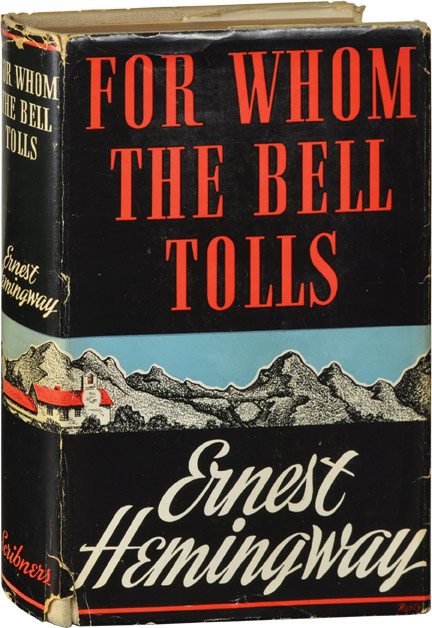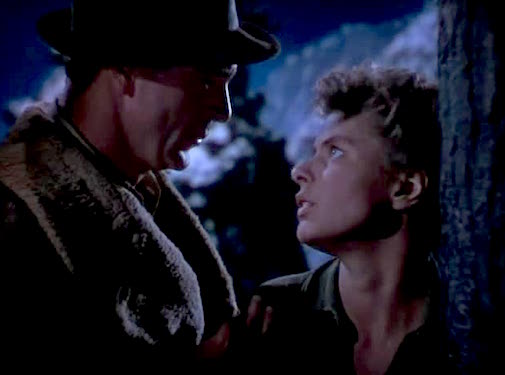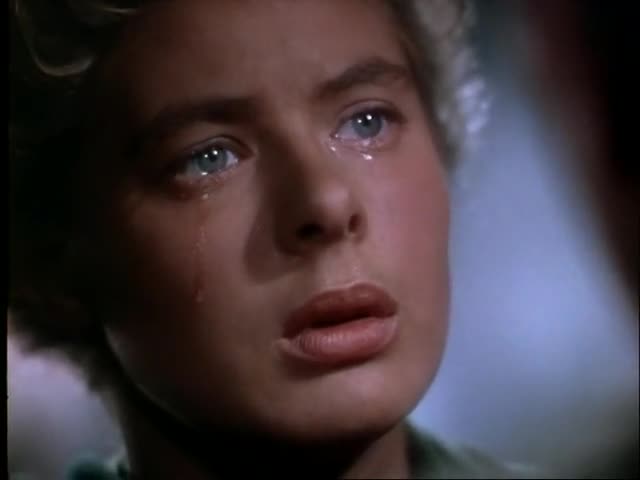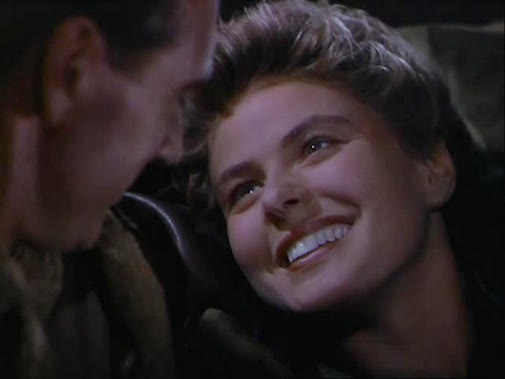Ingrid's First Oscar Nomination
 Monday, August 10, 2015 at 1:00PM
Monday, August 10, 2015 at 1:00PM We continue our Ingrid Bergman Centennial with Andrew Kendall on For Whom the Bell Tolls (1943)
 It's difficult to speak of Ingrid Bergman without consider her place in Oscar history. She's one of the few people to win three acting Oscars. And, she's fourth (only to Kate, Meryl and Bette) when it comes to Oscar's Actress Hierarchy. For modern fans, then, the celebrity of that first nomination is a curio regardless of its quality. When did Oscar first bite? For Ingrid it came four years (and five films) after her Hollywood debut. Not for that year's best picture winner Casablanca, but for the adaptation of For Whom the Bell Tolls. Casablanca, and Ingrid's "Ilsa," have endured as such integral parts of film culture that her work in For Whom the Bell Tolls immediately faces the scrunity of living up to it. Why the vote for this over her work there?
It's difficult to speak of Ingrid Bergman without consider her place in Oscar history. She's one of the few people to win three acting Oscars. And, she's fourth (only to Kate, Meryl and Bette) when it comes to Oscar's Actress Hierarchy. For modern fans, then, the celebrity of that first nomination is a curio regardless of its quality. When did Oscar first bite? For Ingrid it came four years (and five films) after her Hollywood debut. Not for that year's best picture winner Casablanca, but for the adaptation of For Whom the Bell Tolls. Casablanca, and Ingrid's "Ilsa," have endured as such integral parts of film culture that her work in For Whom the Bell Tolls immediately faces the scrunity of living up to it. Why the vote for this over her work there?
But, it’s essential to remember that films and awards as creatures of their time. At the time of its production Casablanca was merely a minor World War II drama and literary adaptations were all the rage (from 1937 through 1942 every Best Picture winner was an adaptation of a recently pubished text). The adaptation of the literary triumph of 1940 was the bigger ticket. Ingrid was desperate for the role and Hemingway also loved the idea. In a 1971 interview Bergman revealed that Hemingway, a writer typically averse to being too involved in adaptations of his work, lobbied significantly for Bergman to get the role even reportedly sending her a copy of the novel with the inscription
Paramount, on the other hand, was looking at other actresses, and though David Selznick was eager to lend Bergman out, orchestrating machinations like having Bergman photographed by Life magazine with Martha Gellhorn (Hemingway’s wife), Vera Zorina was cast. It wasn’t until Casablanca was wrapping that word from Paramount indicated they were unhappy with Zorina’s performance. Would Ingrid be willing to do an official audition? She was and she did. She won the part.
And, yet, to look at For Whom the Bell Tolls, the tale of the America university instructor helping the Spanish rebels during the Civil war, it is not quite discernible why Ingrid was so certain that this film would cement her ability as a dramatic performer. Maria, is a young Spanish woman whose life has been ruined by her parents' execution at the hands of Fascist. She currently lives in the guerrilla camp our protagonist has infiltrated playing daughter and helper to de facto leader of the group Pilar. Gary Cooper’s republican rebel falls in love with her. Maria herself has no dramatic arc, just a romantic one. As the rebels plot to blow up a bridge Maria “falls in love” with Roberto and relays her history as a hater of fascism. It’s an incredibly passive role to the point that it strains credulity to consider her the lead (Incidentally, Katina Paxinou who won the Oscar for Supporting Actress for this same film, received a runner-up citation from the New York Film Critics Circle Awards for Best Actress).
Though Cooper nails Roberto's world-weariness, he's not at his best here, dulling any interest we might have in him or his quest. It is left to Ingrid then, in the thankless tradition of so many female roles in blockbusters, to give him added dimenion by her sincere devotion. The issue of Ingrid Bergman in For Whom the Bell Tolls isn't that her talents had yet to develop; the problem is the film is hardly interested in them.
Still, there are moments to savour. She gives good face.


Three scenes are key to her performance: a confession to Roberto about her treatment in the hands of the fascist (a rape which the film does not explicitly state but Ingrid intimates); a passioned quasi-monologue which Ingrid prays for Roberto’s safety; And the sad finale.
For Whom the Bell Tolls pales against her later Oscar-nominated work, but must have registered strongly at the time. It did at least prove that she couldn't be lost in an ensemble with its focus elsewhere (the role is a sliver, and yet she registers), and, in combination with Casablanca, it proved her leading lady bonafides as one of the great romantic heroines. Even with unflattering hair, her glamour cannot be diminished.
The movie itself fades in memory but her expressive face isn't to be forgotten. It's a world cinema treasure.




Reader Comments (13)
This movie is a rough go. Sam Wood could be a fine director with the right project. But he's in over his head here--he cannot shape the material into anything coherent. The film fairly plods along, with only flashes of energy. This spells doom for a movie of this kind. Ingrid is miscast, and her accent is all wrong. But she's the best thing here, and has star quality all over the place. It's an exciting performance, just not quite the one she was hoping for.
...Vera WHO?!?!? Do you think she ever blamed Ingrid for her lack of career after this?
I loved this movie when I first saw it and I love it today. It's my favorite adaptation of any Hemingway novel and it stars my favorite actress ever (Bergman) and my favorite classic film actor (Cooper). Katina Paxinou (winning a well-deserved Best Supporting Actress Oscar) and Akim Tamiroff (who was nominated as Best Supporting Actor) obviously deliver fine support. I disagree with brookesboy's comment about how it plods along because it was very exciting to me, even as a 13-year-old boy watching it in 2003/04. It's held a place on my top 100 ever since.
What a coincidence! I saw it for the first time ever like two weeks ago.
I didn't like it. It was endless and I didn't believe Ingrid as María at all. Loved the haircut and the makeup. They knew what they were doing those golden-age-stylists. Wish I had them.
I could stare at her face all day.
This is SO bad. It's the great grandfather of modern Oscar-bait, dull and important.
I found this a ponderous bore even with all the Cooper/Bergman star power. I watched it specifically because of Ingrid's nomination and spent most of the movie trying to figure out how the hell she got the nod for this instead of Casablanca. Even with this one's pedigree by the time the nominations were announced Casablanca had hit big and racked up all those other nods.
Paxinou is good but I don't think she was good enough to win. Both the un-nominated Anne Baxter in Five Graves to Cairo and my choice for winner Lucile Watson who did score a nomination, in Watch on the Rhine were better.
The studios used to refer to films like "For Whom The Bells Toll" as "prestige" films. Studio heads or top producers liked to make these occasionally as an ego balm to the criticism of all the crowd pleasers they usually cranked out of Tinseltown. Selznick and Thalberg, especially. Fox's "The Razor's Edge" or "Wilson" were pet projects of Zanuck. "Watch on the Rhine" at Warners... MGM had a kazillion of them. Most of them are snoozefests or curios...
Nothing will ever compare to "Casablanca".
I agree that although intentions were good "For Whom The Bell Tolls", it's a worthy try with interesting moments at best. I like your statement "Ingrid gives good face". For me, she has those wonderful expressive eyes, and that haircut. And sadly that's about it.
But I don't dislike it, because for me, Bergman is always interesting.
I agree that the movie's a bit of a mess. Definitely hard material to adapt, so I think they basically just stuck to the book as faithfully as they could. Probably not the best approach, The performances, however, are great and I have a soft spot for the book, definitely one of my favorites. I still find it annoying that they used Greek, Georgian and Sweden(!) actors to play Spaniards... but then that's probably mild chauvinism.
Absolutely true that films and awards are based on many factors related to their years. Casablanca was released in January of 1943 and grossed around $3.7 million ($50 million in today's dollars) making it the 7th grossing film of that year. And it was not considered "one of the greatest films of all time". It only grew in popularity over many years to be elevated to the status that we know it today. At the time there were many WW2 films released. On the other hand, For Whom the Bell Tolls had a July 1943 release and grossed $11.7 million ($158 million today) and was the number 1 film that year. It was a huge prestige film from a popular novel by a beloved author. Also, during those years of the studio system many actors were encouraged to vote for actors who worked at their own studios. It's possible that more actors at Bell Tolls' Paramount studio voted for Bergman as Maria than Casablanca's Warner Brothers actors voted for Bergman as Ilsa.
Actually it raked in $446 million in today's currency in the US market only. This is the #1 blockbuster in 1943. Casablanca's win for BP and BD actually was an upset as the favorite was The song of Benedette.
Yes, an absolute blockbuster....the reason why Our Dear Ingrid Bergman wanted the part. The day after her audition... no news... she assumed no Maria ... the call from Zelznick came the next day....he and his wife, Irene, accompanied Ingrid to the barbershop.....a bob of a haircut that became all the fashion